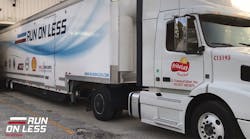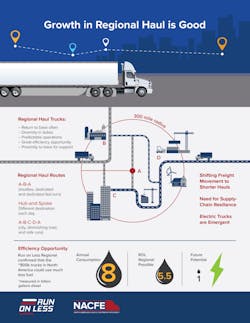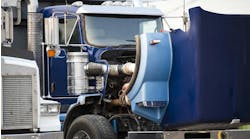The duty cycles within the trucking’s regional haul segment vary greatly, from dedicated fast turns that emphasize speed to the efficiency-conscious hub-and-spoke model. Regardless, the North American Council on Freight Efficiency (NACFE) found in its recently released Run on Less Regional Report that the current slate of truck models complemented with the right equipment can increase the regional haul average from 6 mpg to 8.3 mpg.
The insights are available via an executive summary or 60-page full report. The findings are too numerous to list in one article, but the overarching message is that spec’ing regional fleets with an eye on efficiency can yield serious savings.
If all 800,000 trucks in the regional haul segment, which NACFE defines as Class 7 and 8 tractors that operate within a 300-mile radius of a home base, were to operate at this fuel efficiency, hit that mark, the industry would reduce fuel costs by $9 billion and eliminate 30.6 million tons of CO2 annually.
One reason for the dramatic impact is that “Fuel economy seems to be a lower priority for regional haul fleets,” the report stated. More often than not, “getting the equipment and driver home when needed tended to be higher priority than the amount of fuel used.”
These findings were collected over 18 days in the fall of 2019 using 10 trucks (2017 model year or newer and only using commercially available technologies), which varied widely in make, equipment, duty cycle, load, operating radius and driver experience. The fleets included C&S Wholesale Grocers, Hirschbach, Hogan Transportation, J.B. Hunt, Meijer, PepsiCo, Ploger Transportation, Schneider, Southeastern Freight Lines, and UPS.
For a list of the drivers and their trucks specs, click here.
Freight loads ranged from zero, termed deadheading, to maximum allowed vehicle weights. Excluding the compressed natural gas truck, the average for the nine diesel trucks was 8.7 mpg. On average, the trucks traveled 435 miles per day.
NACFE executive director Mike Roeth, a regular contributor to FleetOwner, cautioned against getting too caught up with averages in such an eclectic environment as regional haul, which from a statistical viewpoint is “very dangerous.”
“You get huge differences in where they operate, what their loads are, how often they're stopping, how fast they're driving, whether it’s on freeways or on state routes,” he said.
The seven duty cycles ripe for regional picking include shuttles, dedicated, dedicated fast turn, hub-and-spoke, city, diminishing load and milk runs.
Other key insights NACFE gleaned were that drivers being able to return home at night made the profession more appealing, and the shorter ranges create opportunities for electrification.
Again, because regional is such a diverse field, battery-electric trucks will not be the best choice every time. Roeth explained that Hirschbach performed three 140-mile round trip drop-and-hooks a day, so at least 420 miles daily. The range for currently tested electric trucks does not exceed 200 miles per charge, and even fast charging is much longer than traditional fuel fill-ups. The next year should see major range extension, though. The Tesla Semi claims to have range options of 300 and 500 miles and may finally start rolling off the factory floor next year, while the Nikola Tre should begin production in Ulm, Germany in 2021 as well.
As they also get more data and learn from ongoing pilot projects, the traditional truck OEMs should also rapidly improve to meet the new demands of the regional segment.
“These are truly exciting times and NACFE again helps make it clear how much improvement is possible regarding fuel economy and provides a pragmatic look at the future of moving good,” said Magnus Koeck, vice president of marketing and brand management, Volvo Trucks North America. “Within this report, readers will learn how to play a bigger role in transforming trucking. We are challenging all manufacturers to join us in accelerating the work on reducing fuel use for current tractors and taking advantage of emerging zero-emission solutions, as we are doing within the Volvo LIGHTS project and our all-electric VNR model.”





